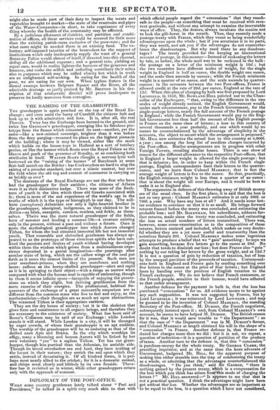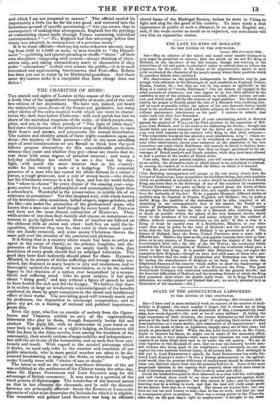DIPLOMACY OF THE POST-OFFICE.
WHEN some country gentleman lately talked about " Peel and Providence," he talked in a spirit very much akin to that with which official people regard the " concessions " that they vouch- safe to the people—as something that must be received with reve- rent gratitude, and without any attempt to examine the inscrutable ways of office. They, the donors, always inculcate the maxim not to look the gift-horse in the mouth. Thus, they recently made a postage-treaty with France, which they vaunt as being wonderfully advantageous upon the whole ; but if you scrutinize it in its parts, they wax wroth, and ask you if the advantages do not counterba-
lance the disadvantages. But why need there be any disadvan- tages ? The treaty provided for the keeping an international account of postage, in this manner—Instead of reckoning the letters by tale, as before, the whole mail was to be reckoned in the bulk: the postage on a letter of the minimum weight is 10d.; but the two countries have different scales of weight, for the single weight in England is half an ounce, the double weight one ounce, and the scale then ascends by ounces; while the French minimum weight is a quarter of an ounce, and the scale ascends by quarter- ounces : in the accounts between the two Post-offices, France is allowed credit at the rate of 20d. per ounce, England at the rate of 12d. When this plan of charging by bulk was first proposed by Lord LICHFIELD, in 1840, Mr. ROWLAND HILL pointed out to the Chan- cellor of the Exchequer, " that, owing to the difference in the two scales of weight already noticed, the English Government would, under such circumstances, pay to the French Government, for the single-postage letters, nearly the full amount of the French postage in England ; while the French Government would pay to the Eng- lish Government less than half the amount of the English postage iu France on the same class of letters ; a loss to this country of several thousands a year probably, and one which would by no means be counterbalanced by the advantage of simplicity in the accounts, the object to secure which the arrangement is proposed." Mr. HILL now estimates the actual loss to this country at 4,0001. a year ; one among the long list of needless charges incurred by the Post-office. Similar arrangements are in progress with other Foreign Powers, entailing similar losses. There is one show of reason for the different allowance to the respective Post-offices, that in England a larger weight is allowed for the single postage : but that is delusive ; for, in order to keep within the French single postage, English correspondents limit their letters to the quarter- ounce, and we learn from Colonel MABERLY, that in fact the average weight of letters is five to the ounce. So that, practically, the English minimum weight is less than a quarter of an ounce : that is about the weight all over Europe, and it would be best to make it so in England also. The arguments in defence of this throwing away of British money i are of the usual class. In the first place, it is said that the loss is not so very great : Colonel MABERLY estimates it at only 5001. or 7001. a year. Why have any loss at all ? And it needs some bet- ter evidence to convince us that it is so small. He brings forward returns framed before the treaty was concluded, and estimating the probable loss ; and Mr. BOKENHAM, his subordinate, adduces fur- ther returns, made since the treaty was concluded, and estimating the loss on actual numbers of letters transmitted. There was, however, some cross-examination as to the composition of these returns, letters omitted and included, which makes us very doubt- ful whether they are a jot more useful and trustworthy than the notorious Return 201. Colonel MABERLY makes some ingenious attempts to produce a belief that we " gain" something : he says we gain something, because five letters go to the ounce at 20d. No doubt that tends to diminish our loss ; but does France also "gain" nothing by our taking her letters by the gross weight, and at 12d.? It is not a question of gain by reduction of taxation, but of loss by the unequal partition of the proceeds of taxation. Correspond- ents both in England and France gain by sending something over five letters in the ounce at the price of four letters ; but England loses by handing over the produce of English taxation to the French exchequer. We do not believe that French statesmen, or the French people, sensitive to their honour, would have adhered to that unfair arrangement.
Another defence for the payment in bulk is, that the loss has purchased "concessions " for us. All evidence seems to be against any such supposition. It was not suggested by France, but by Lord LICHFIELD ; it was reiterated by Lord LOWTHER ; and may be guessed to be the invention of Colonel MABERLY, the standing Secretary of the Post-office. M. DuBosT, the French negotiator, subsequently insisted upon it ; and, from Colonel MABERLY'S own account, he seems to have helped M. DITnOST. The British reason for it was, that it would save trouble to " the Department ": so that the ease of " the Department " was in M. Duman' s favour, and Colonel MABERLY at length obtained his will in the shape of a " concession " to France. Another defence is, that France re- duced her charges more than we did : but it is not, we repeat, a question of reduction—it is a question of partition of the produce of taxes. Another turn to the defence is, that this " concession" is purchase-money for the whole treaty. Sir GEORGE CLERK, the presiding inquisitor, and at the same time the keen advocate of Government, badgered Mr. HILL, for the apparent purpose of making him either stumble into the trap of condemning the treaty as a whole, or admitting that the advantages counterbalanced the disadvantages. " Do you think," said Sir GEORGE, " there is nothing gained by the present treaty, Which is a compensation for the loss which you think has arisen froidlitis mode of charging the letters ?" Mr. HILL answered—" It appears to me that that is not a practical question. I think the advantages might have been got without that loss. Whether the advantages are so important as to be equal to the loss, is a question which I have not considered, and which I am not prepared to answer." The official carried his importunity a little too far for his own good, and ventured into the hazardous ground of specific questioning—" Are you aware, that in consequence of making that arrangement, England has the privilege of transmitting closed mails through France containing individual correspondence ? "—" No ; England had that advantage before that treaty was adopted, in consequence of a previous treaty." It is to these officials—thus paying some unknown amount, rang- ing from 5001. to 4,0001. or more, to save trouble to "the Depart- ment "—quibbling and special-pleading to shuffle "blame " off their own shoulders—tampering with returns—always thinking of them- selves only, and taking extraordinary merit to themselves if they make " concessions " to their own master the public,—it is to such interested and equivocating functionaries that Post-office Reform has been put out to nurse by its Ministerial guardians. And these same dry-nurses make it a complaint that their charge does not thrive































 Previous page
Previous page